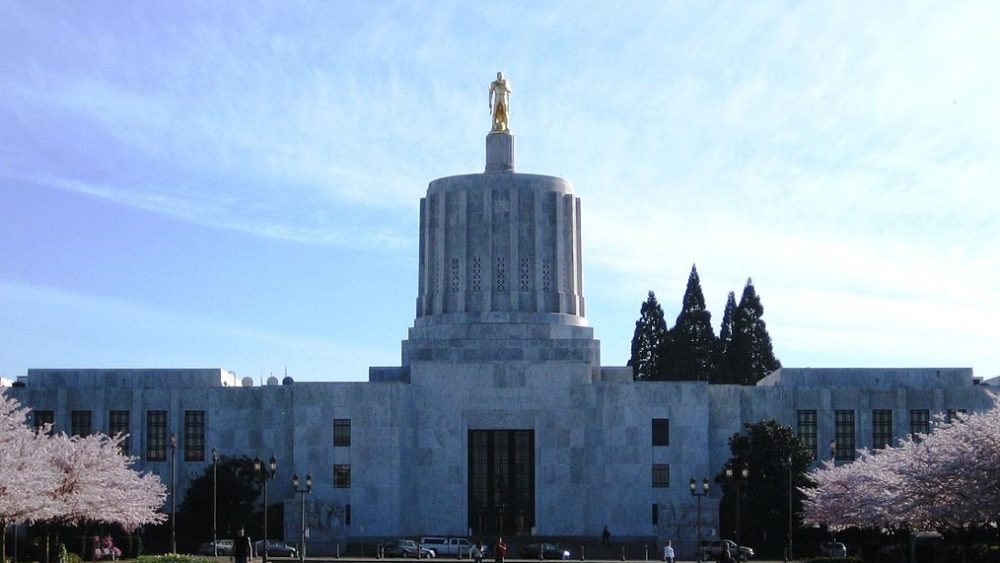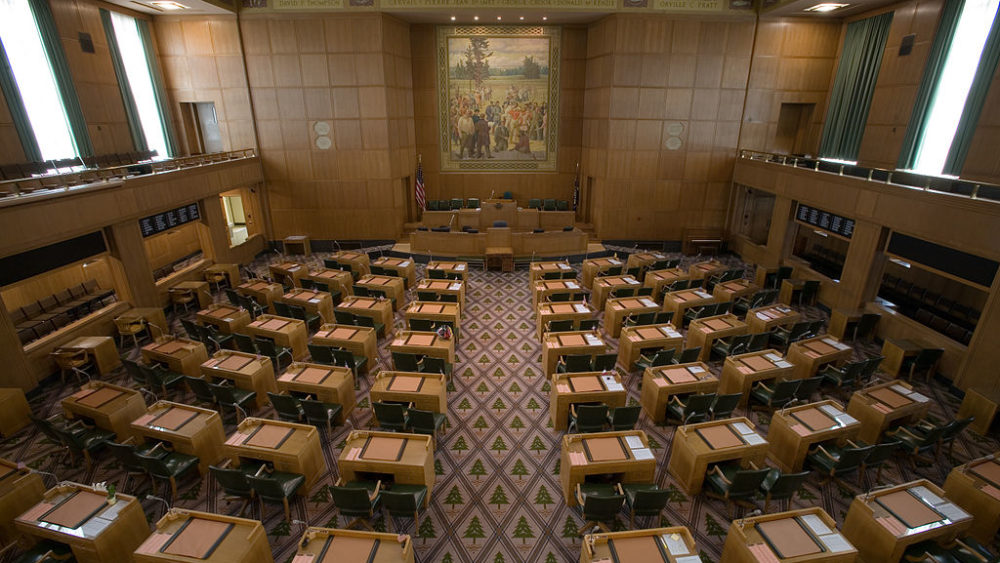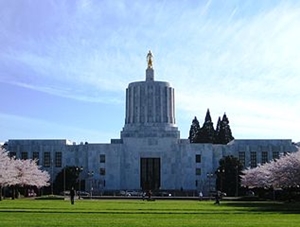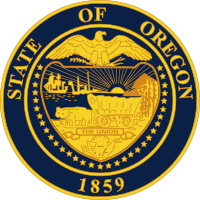December 22, 2020 •
Oregon Lawmaker Pass COVID-19 and Wildfire Relief Bills Despite Disruption from Protestors

Oregon State Capitol Building
The Oregon Legislature gathered in person for a one day special session on Monday. During the session, lawmakers passed four bills including $800 million in relief for those struggling due to the pandemic and the aftermath of the historic summer […]
The Oregon Legislature gathered in person for a one day special session on Monday.
During the session, lawmakers passed four bills including $800 million in relief for those struggling due to the pandemic and the aftermath of the historic summer wildfires.
Gov. Kate Brown called for the special session last week.
Lawmakers also passed:
- An eviction moratorium including $200 million in relief for landlords and tenants
- A restaurant relief package with a provision legalizing cocktails to-go
- A bill protecting schools from some coronavirus related lawsuits
- A measure transferring $600 million into the state’s emergency fund for COVID-19 and wildfire response and recovery.
The special session got off to a chaotic start with far-right protesters storming the statehouse calling on lawmakers and the governor to reopen the state economy and end the restrictions aimed at curbing the coronavirus.
The Oregon State Police declared an unlawful assembly as a growing number of protesters pushed their way through the Capitol doors.
Police officers donned gas masks as they squared off with protesters, some of whom carried firearms and bear spray, and many of whom were not wearing masks.
Despite the hectic backdrop, lawmakers were able to finish the special session.
August 5, 2019 •
Oregon Governor Signs Campaign Finance Reform Bills

Oregon Gov. Kate Brown
Gov. Kate Brown signed two campaign finance bills requiring more disclosures in Oregon elections. House Bill 2716 requires advertisements supporting or opposing a candidate to disclose who funded them. The bill also requires ads funded by non-candidate PACs to disclose […]
Gov. Kate Brown signed two campaign finance bills requiring more disclosures in Oregon elections.
House Bill 2716 requires advertisements supporting or opposing a candidate to disclose who funded them.
The bill also requires ads funded by non-candidate PACs to disclose the top five donors who have contributed at least $10,000 to those groups.
House Bill 2716 becomes effective December 3, 2020.
House Bill 2983 requires “dark money” groups to disclose their largest donors if they spend more than $100,000 on ads related to statewide races or races in cities or counties with at least 60,000 residents.
For legislative races and contests in smaller jurisdictions, the bill requires groups to disclose donors after spending at least $25,000 on ads.
House Bill 2983 became effective when signed by the governor.
July 23, 2019 •
Oregon Governor Signs Lobbyist Training Bill

Oregon Gov. Kate Brown
Gov. Kate Brown signed legislation on July 23 requiring registered lobbyists to attend annual training beginning in 2021. House Bill 3377 directs lobbyists to certify training attendance to the Oregon Ethics Commission. The bill also requires the commission to report […]
Gov. Kate Brown signed legislation on July 23 requiring registered lobbyists to attend annual training beginning in 2021.
House Bill 3377 directs lobbyists to certify training attendance to the Oregon Ethics Commission.
The bill also requires the commission to report lobbyist training attendance to the legislative equity officer.
House Bill 3377 becomes effective on January 1, 2021.

Oregon House of Representatives Chamber - Cacophony [CC BY 3.0 (https://creativecommons.org/licenses/by/3.0)]
Gov. Kate Brown signed House Bill 2595 on May 3. The bill prohibits a former member of the Legislative Assembly from receiving money or any other consideration for lobbying within one year after ceasing to be a member of the […]
Gov. Kate Brown signed House Bill 2595 on May 3.
The bill prohibits a former member of the Legislative Assembly from receiving money or any other consideration for lobbying within one year after ceasing to be a member of the Legislative Assembly.
Currently, the revolving door period begins on the date the person ceases to be a member of the Legislative Assembly. The period then ended on the date of adjournment sine die of the next regular session after the person ceases to be a member.
House Bill 2595 applies to persons who cease to be members of the Legislative Assembly on or after the effective date of January 1, 2020.
May 22, 2018 •
Oregon Legislature Adjourns One-day Special Session
The Oregon Legislature adjourned a one-day special session on May 21, 2018. The special session was called by Gov. Kate Brown to address tax breaks for small businesses. The tax plan passed 51-8 in the House and 18-12 in the […]
 The Oregon Legislature adjourned a one-day special session on May 21, 2018.
The Oregon Legislature adjourned a one-day special session on May 21, 2018.
The special session was called by Gov. Kate Brown to address tax breaks for small businesses. The tax plan passed 51-8 in the House and 18-12 in the Senate.
Both votes included Democrats who broke from their party to vote against the measure.
April 25, 2018 •
Oregon Governor Calls Special Legislative Session for May 21
Gov. Kate Brown called a special session for May 21, 2018. The session is expected to be limited to legislation reducing small business taxes. The governor announced she wants to complete the special session in a single day.
 Gov. Kate Brown called a special session for May 21, 2018.
Gov. Kate Brown called a special session for May 21, 2018.
The session is expected to be limited to legislation reducing small business taxes.
The governor announced she wants to complete the special session in a single day.
September 20, 2017 •
Lobbyist Leaves Firm to Take Seat in Oregon Legislature
Gov. Kate Brown administered the oath of office to the now-former lobbyist for powerful public employee unions SEIU Local 503 and AFSCME Council 75, among other left-leaning groups. Andrea Salinas was appointed by the commissioners of Multnomah and Clackamas Counties […]
 Gov. Kate Brown administered the oath of office to the now-former lobbyist for powerful public employee unions SEIU Local 503 and AFSCME Council 75, among other left-leaning groups.
Gov. Kate Brown administered the oath of office to the now-former lobbyist for powerful public employee unions SEIU Local 503 and AFSCME Council 75, among other left-leaning groups.
Andrea Salinas was appointed by the commissioners of Multnomah and Clackamas Counties to fill the vacancy.
Rep. Salinas is unsure what she will do work for outside the Legislature since she had to resign her lobbying position.
July 10, 2017 •
Oregon Legislature Adjourns; Lobbying Reform Bill Dies
The Oregon Legislature adjourned July 7, three days before its July 10 constitutional deadline. In the final days of the session, lawmakers passed a $5.3 billion package of taxes and fees to fund transportation upgrades and another bill to reduce […]
 The Oregon Legislature adjourned July 7, three days before its July 10 constitutional deadline.
The Oregon Legislature adjourned July 7, three days before its July 10 constitutional deadline.
In the final days of the session, lawmakers passed a $5.3 billion package of taxes and fees to fund transportation upgrades and another bill to reduce state spending by $200 million over the next two years.
However, lawmakers failed to pass lobbying reforms introduced at the request of Gov. Kate Brown. Following a flurry of last-minute activity in the House to pass Senate Bill 43, a bill to modify Oregon’s lobbyist registration and reporting requirements, the Senate opted to let the bill die.
July 6, 2017 •
Oregon House to Consider Lobbying Reform Bill
Senate Bill 43, a bill to modify Oregon’s lobbyist registration and reporting requirements, is set for its third reading in the House on July 6. The bill clarifies certain public officials and persons who provide professional services to entities meeting […]
 Senate Bill 43, a bill to modify Oregon’s lobbyist registration and reporting requirements, is set for its third reading in the House on July 6.
Senate Bill 43, a bill to modify Oregon’s lobbyist registration and reporting requirements, is set for its third reading in the House on July 6.
The bill clarifies certain public officials and persons who provide professional services to entities meeting specified criteria are not exempt from lobbyist registration and reporting requirements. Senate Bill 43 expands current lobbyist exemptions to additionally include elected public officials, certain representatives supervising an entity’s lobbying activities, and individuals who meet with legislative members in a personal capacity.
The measure expands the information a lobbyist must include on a registration statement. The registration must name each political committee the lobbyist advises or controls, each political committee for a candidate or elected official the lobbyist-controlled political committee made political campaign contributions to, and an acknowledgement the lobbyist has read and understands laws and administrative rules governing lobbyists.
Senate Bill 43 requires lobbyist reporting statements to include identification of each topic and each measure lobbied on and will require statements to be filed monthly during the legislative session. The bill also requires the Oregon Government Ethics Commission to conduct random audits of lobbyist reporting statements. The effective date for changes to lobbyist reporting statements is April 1, 2018.
The bill declares an emergency, meaning most provisions will become effective upon passage. Senate Bill 43 was introduced at the request of Gov. Kate Brown and she is expected to sign the legislation if passed by the July 10 constitutional adjournment date.
The Oregon Government Ethics Commission has asked Gov. Kate Brown to introduce legislation in 2017 to strengthen lobbying registration requirements. The commission wants to crack down on the registration exception that allows persons spending less than 24 hours or $100 […]
 The Oregon Government Ethics Commission has asked Gov. Kate Brown to introduce legislation in 2017 to strengthen lobbying registration requirements. The commission wants to crack down on the registration exception that allows persons spending less than 24 hours or $100 on lobbying per quarter to avoid registering as lobbyists.
The Oregon Government Ethics Commission has asked Gov. Kate Brown to introduce legislation in 2017 to strengthen lobbying registration requirements. The commission wants to crack down on the registration exception that allows persons spending less than 24 hours or $100 on lobbying per quarter to avoid registering as lobbyists.
Brown has until December 9, 2016 to review proposals from state agencies and file bills for the 2017 session.
April 7, 2016 •
Oregon Transparency Bill Becomes Law
Oregon Gov. Kate Brown has signed into law a bill requiring lobbyists to file registration statements within three business days of commencing or ceasing representation of a client. The bill also requires each person employing a lobbyist to sign a […]
 Oregon Gov. Kate Brown has signed into law a bill requiring lobbyists to file registration statements within three business days of commencing or ceasing representation of a client. The bill also requires each person employing a lobbyist to sign a designation of official authorization to lobby within 10 calendar days after the lobbyist files the registration statement.
Oregon Gov. Kate Brown has signed into law a bill requiring lobbyists to file registration statements within three business days of commencing or ceasing representation of a client. The bill also requires each person employing a lobbyist to sign a designation of official authorization to lobby within 10 calendar days after the lobbyist files the registration statement.
The bill has an emergency clause making it effective immediately; however, the bill states it applies to lobbyist registration statements filed on or after January 1, 2017.
July 22, 2015 •
Oregon Ethics Commission to Expand to Nine Members
Gov. Kate Brown signed House Bill 2019 into law, expanding the membership of the Oregon Ethics Commission from 7 members to 9, effective July 1, 2016. Lawmakers passed many ethics reforms during the 2015 legislative session as a result of […]
 Gov. Kate Brown signed House Bill 2019 into law, expanding the membership of the Oregon Ethics Commission from 7 members to 9, effective July 1, 2016.
Gov. Kate Brown signed House Bill 2019 into law, expanding the membership of the Oregon Ethics Commission from 7 members to 9, effective July 1, 2016.
Lawmakers passed many ethics reforms during the 2015 legislative session as a result of the ethics scandals and resulting resignation of former Gov. John Kitzhaber.
State and Federal Communications, Inc. provides research and consulting services for government relations professionals on lobbying laws, procurement lobbying laws, political contribution laws in the United States and Canada. Learn more by visiting stateandfed.com.

